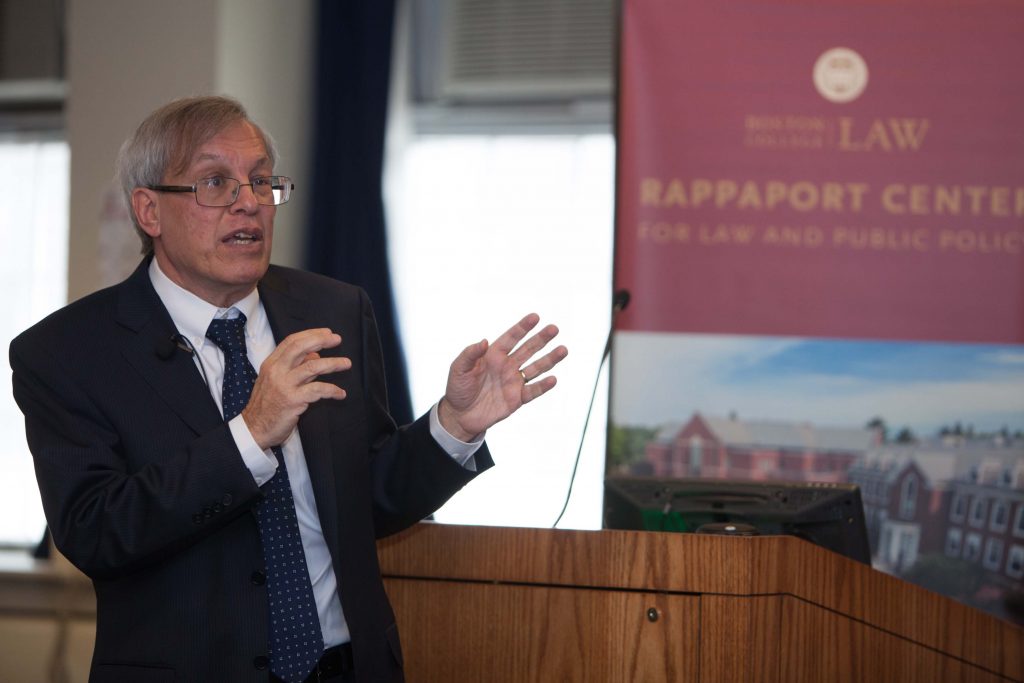The freedom to express controversial opinions and viewpoints without the fear of government reprisal is often shown as one of the greatest achievements of Western Civilization. However, from prosecution for “illegal opinions” in Germany to potential jail time for “grossly offensive” humor in Scotland, many appear to be finding justifications to increasingly limit this freedom, which the American founders considered to be an inherent natural right. While the United States Supreme Court continues to provide substantial protection for free expression, public institutions of higher education are held to different standards from private ones in this regard.
The differences are at the heart of a crisis of speech and intellectual diversity on college campuses, a topic that was dissected at a Rappaport Center for Law and Public Policy event at BC Law on March 20. The panel included constitutional scholar and First Amendment expert Erwin Chemerinsky (above), dean of Berkeley Law School, who gave the keynote address. The discussion was moderated by BC Law Professor Kent Greenfield.
In many colleges and universities, where mere decades before students held rallies in support of free speech, students are now voicing concerns about giving “platforms” to opinions that in their view are toxic and can threaten the safety and mental well-being of some of their peers, Chemerinsky said. These highly publicized events have challenged people to reflect upon the foundational principles of free speech.
Professor Chemerinsky argued that, though the Supreme Court has forbade the government from creating liability solely on the offensive nature of speech, “we also know that the right to speech is not, and cannot be, absolute…and that there are categories of speech that for public policy reasons, are denied any constitutional protection.” This, it is argued, is one of the primary ideological foundations for those who wish to more closely regulate speech, and speakers, on college campuses.
Reflecting upon free speech on campus, Chemerinsky presented factors and challenges facing administrators, many of whom wish in good faith “to uphold high standards of free speech in the face of high media attention, outside interference, and student pressure.” One factor he mentioned was identifying truly unprotected categories of speech, such as incitement, a claim that is often leveled by activists against (mostly) conservative-leaning speakers. School administrators are often required to carefully scrutinize the content of prospective speakers and make constitutional decisions in high-pressure situations, Chemerinsky noted.
Another, perhaps even more critical factor facing free speech on campus, Chemerinsky said, is that of economics. Drawing upon the recent experience of UC Berkley, he said that administrators, committed to upholding Free Speech Week, agreed to take on the over $3.7 million cost for security that the protests, media attention, and counter protests required. But what if there was not just a free speech week, but a free speech semester? Chemerinsky argued that sometimes outside activists and high levels of media attention drive tempers to a boiling point, and raise security expenses to untenable levels.
Faced with such Solomonic choices, where any strong decision risks angering one party or another, or displaying the institution in a bad light on national media, it’s understandable that administrators and professors often appear to hesitate on whether the ideological principles of academic freedom and free speech are worth the cost to their property, their image, and sometimes, their very careers, Chemerinsky said.
Panelists Nancy Leong of the University of Denver Sturm College of Law and Mary-Rose Papandrea of the University of North Carolina School of Law brought other thoughts to the table. Leong suggested that there are four ways to regard freedom of expression on campus that can allow for more nuanced discussion and understanding: the First Amendment, norms related to free speech, strategy, and manners. “I think it’s important to conceptually separate those four things, even though they often overlap, or intersect, with one another,” she said.
Papandrea, a First Amendment scholar who formerly taught at BC Law, a private school, said that now that she is at a public institution she is “living what I’ve been preaching.” Because state universities and college are publicly funded, they are compelled to comply with the First Amendment in ways that private institutions are not. She said UNC has a free speech board that helps the school handles the issues that arise.
Read another report of the event in The Heights.


